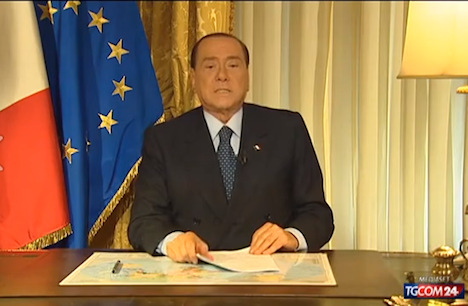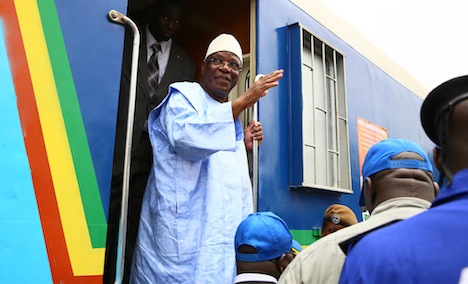Although Italy’s highest court upheld a one-year sentence against former Italian prime minister Silvio Berlusconi today, the longtime center-right leader made it clear that he intended to remain in the thick of Italian politics for the next year and then some.![]()
Berlusconi’s legendary legal troubles outdate even his nearly two-decade political career, but today was the first time that Italy’s Corte di Cassazione (Court of Cassation) upheld any of Berlusconi’s multiple criminal convictions. The decision upheld Berlusconi’s conviction for tax fraud and upheld the four-year sentence, though the actual sentence has been reduced to one year, thanks to an amnesty passed into law by former center-left prime minister Romano Prodi back in 2006. But Berlusconi is unlikely headed to prison anytime soon, due to his advanced age (76) and the fact that this is technically his first final conviction — Berlusconi has successfully appealed previous convictions or otherwise evaded jail time due to immunity while in public office or through the expiration of the statute of limitations.
Furthermore, the court remanded for review by the lower appeals court in Milan a previous five-year ban on holding public office, which the court ruled should not last five years, but instead between one and three years. Berlusconi’s public service ban will therefore need to be confirmed by the upper house of Italy’s parliament, the Senato (Senate).
That creates an immediate tripwire for prime minister Enrico Letta’s ‘grand coalition’ government that has brought Berlusconi’s Il Popolo della Libertà (PdL, the People of Freedom) together with the center-left Partito Democratico (PD, Democratic Party). Together, the two parties hold a majority in the Senate, but the PdL holds just 98 out of 315 seats. Berlusconi’s ally, the Lega Nord (Northern League), holds an additional 18 seats, even though it’s chosen not to join the current governing coalition. So in order to evade the public office ban, Berlusconi will need the support of the Letta and the Democrats, and there’s a real danger that Berlusconi will threaten to bring the Letta government down unless they back him.
But that’s assuming the Letta government even makes it that far, in light of an economy that shrank by 0.6% in the first quarter of 2013 alone and a generation-high unemployment rate of 12.2% as of May 2013. Despite Letta’s hopes to reform Italian finances, the PdL campaigned on reversing an unpopular property tax levied by the previous technocratic government of prime minister Mario Monti last year, so Berlusconi and his allies are pushing to scrap the property levy and to prevent a proposed 1% increase in the highest bracket of Italy’s value-added tax. Meanwhile, Berlusconi’s top lieutenant, deputy prime minister and interior minister Angelino Alfano is under fire for the swift deportation of the wife and six-year-old daughter of Kazakh dissident oligarch Mukhtar Ablyazov in May. Letta’s minister for integration, Cécile Kyenge, and Italy’s first black government minister, has faced a barrage of racial slurs — most recently, an opponent threw bananas at her during a speech last week.
Monti, who formed the centrist, pro-reform Scelta Civica (Civic Choice) in advance of February’s election, and who, alongside other centrist allies, forms the third and smallest bloc in the governing coalition, is allegedly so frustrated that he was ready to resign as leader of his own party yesterday.
Beppe Grillo, the leader of the protest Movimento 5 Stelle (M5S, the Five Star Movement), which finished a strong third-place in February’s elections and who has refused to ally with either the Italian right or the Italian left, compared the Berlusconi conviction to the 1989 fall of the Berlin Wall at his popular blog earlier today.
The volatile Berlusconi is also appealing a preliminary conviction of paying for sex with underaged Moroccan dancer Karima el-Mahroug and of abuse of office after trying to pressure local authorities to release the dancer after an alleged theft.
After today’s verdict, Berlusconi lashed out in a television address (pictured above) against what he called an irresponsible judiciary, as he’s done so many times before — he attacked the judiciary as a dangerous and unelected branch of government that began with the judicial investigations of the Tangentopoli (Bribesville) scandal in 1992 and 1993 that so thoroughly wiped out the longstanding Italian political order that it marks the unofficial designation between Italy’s ‘first’ and ‘second’ republics. Berlusconi reiterated plans, unveiled just last week, to change the name of his party back to its original name, Forza Italia, in a bid to attract younger voters, renewing speculation that he may be preparing to pass his political baton to his 46-year-old daughter, Marina Berlusconi.
So Berlusconi may well just try to roll the dice by bringing the coalition down immediately and move for early elections now.
He would do so knowing that the Democratic Party itself remains hopelessly divided and leaderless — Letta, though he is prime minister, remains the deputy prime minister of the party, pending a still-unscheduled leadership election later this year. Though 38-year-old Florence mayor Matteo Renzi is the most popular politician in the country, having harnessed the frustration of Italians with the entire spectrum of current political leadership, his potential leadership of the party remains controversial. It could well result in the disintegration of Italy’s Democratic Party, which formed in 2007 after a gradual melding of former moderate Italian Communists and former liberal Christian Democrats.
The latest polls show, essentially, a toss-up: the centrosinistra would win 33.7%, the centrodestra would win 34.3%, Grillo’s Five Star Movement would win 20.6%, and Monti’s centrists would win just 6.1%.
As the always-sharp Alberto Nardelli concluded earlier today:
It’s impossible to make predictions on what will happen next as we’re in unchartered territory, but what is certain is that today was one of the most significant events in Italy’s recent political history and the consequences and risks could be dire however you look at it. Continue reading Berlusconi verdict plunges Italian right (and everyone else) into uncharted uncertainty

